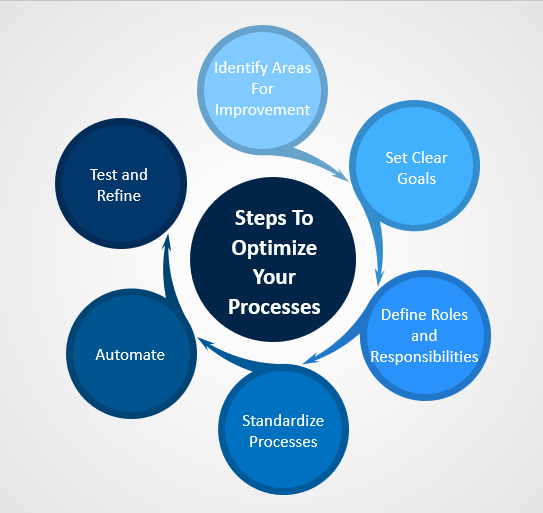Optimizing Operations: Unleashing Process Efficiency For Success
Overview
Process efficiency refers to the effectiveness of a process – how smoothly it runs, how productive it is, and how well it achieves its goals. This can be achieved through a variety of factors, including eliminating waste, improving communication, and utilizing technology.
At its core, process efficiency is about doing things better – getting more output for less input. This is critical for businesses to remain competitive and profitable, as inefficient processes can lead to wasted time, resources, and money.

Importance of Measuring and Monitoring Process Efficiency
Measuring and monitoring process efficiency is crucial to achieving business success. It provides valuable insights into the strengths and weaknesses of a process, enabling businesses to identify areas that require improvement. By evaluating process efficiency, it is possible to:
1. Reduce Costs: Measuring and monitoring process efficiency can help businesses identify opportunities to reduce costs. Improved processes lead to fewer errors, less rework, and a reduced need for resources, enabling businesses to produce goods or services at a lower cost.
2. Improve Productivity: Efficient processes lead to improved productivity and output. By measuring and monitoring process efficiency, businesses can make strategic changes to optimize workflows and improve performance, leading to higher productivity levels.
3. Enhance Customer Satisfaction: Efficient processes result in faster turnaround times, higher quality products, and enhanced customer experiences. By measuring and monitoring process efficiency, businesses can identify areas where they can improve customer satisfaction, resulting in increased loyalty and repeat business.
Steps To Optimize Your Processes
In order to maintain a competitive edge in today's fast-paced business world, it is essential to optimize your processes. By streamlining your operations, you can decrease costs, increase productivity, and improve customer satisfaction.
Here are the steps can can follow to help you achieve optimal process efficiency:
1. Identify Areas For Improvement: Begin by analyzing your existing business processes and identifying areas that are causing bottlenecks or delays. Look for inefficiencies, redundancies, and any steps that can be eliminated or automated. This will involve gathering data, interviewing employees, and examining key metrics.
2. Set Clear Goals: Once you have identified areas for improvement, set clear and measurable goals for each process. This will provide a benchmark for success and help you track progress over time. Make sure your goals align with your overall business objectives, and communicate them clearly to your team.
3. Define Roles and Responsibilities: It's essential to define each team member's role and responsibilities as they relate to the process. This will prevent duplication of effort, confusion, and delays. Assign primary and secondary roles for each step of the process, and ensure that everyone understands their responsibilities.
4. Standardize Processes: Once you have defined each team member's role, document the process in detail. Standardizing your processes will help ensure consistency across teams and minimize the risk of errors or miscommunication. Develop guidelines, checklists, and templates for each step of the process.
5. Automate: Look for software solutions or tools that can help automate your processes. Automation can help you minimize manual labor, reduce errors, and improve productivity. Consider investing in workflow management systems, customer relationship management tools, or project management software.
6. Test and Refine: Once you have established your optimized processes, test them thoroughly to ensure they work as expected. Gather feedback from your team members and customers, and make any necessary adjustments. It's essential to continuously monitor your processes and make improvements as needed.
By following these steps, you can optimize your processes and achieve greater efficiency, productivity, and profitability.
Benefits of Process Efficiency For Your Business
Efficiency in business processes has become a key factor in determining the success of any business. Process efficiency is the ability of an organization to optimize its internal processes to achieve higher levels of productivity, cost savings, and customer satisfaction.
Here are some of the benefits of process efficiency for your business.
1. Increased Productivity: When you have a well-defined process in place, it becomes easier for employees to execute tasks efficiently. With automated processes and tools, they can accomplish more in less time. As a result, the overall productivity of the organization increases, leading to more significant output and revenue.
2. Cost Savings: By improving your business processes, you can identify areas where you are overspending and eliminate unnecessary expenses. By cutting down on waste and streamlining workflows, you can save money on operational costs and pass on the savings to customers or invest in other areas of your business.
3. Competitive Advantage: Process efficiency can provide a competitive edge to an organization. By automating tedious and repetitive tasks and reducing waste, businesses can focus more on core tasks, such as developing new products, improving customer relations, and adapting to market changes.
4. Better Customer Service: When business processes work efficiently, customer requests are addressed quickly, and product or service delivery timelines are met. As a result, customers are more satisfied and more likely to return to a business that delivers quality services.
5. Improved Quality: Efficiency and quality often go hand in hand. Improved processes reduce the risks of errors and delays, which would adversely affect product or service quality. A focus on quality can increase consistency, customer satisfaction, and lead to more loyal customers over time.
Conclusion
In conclusion, process efficiency is critical to the success of any organization. It enables organizations to streamline their processes, increase productivity, reduce costs, improve operational efficiency, and ultimately, enhance customer satisfaction.

